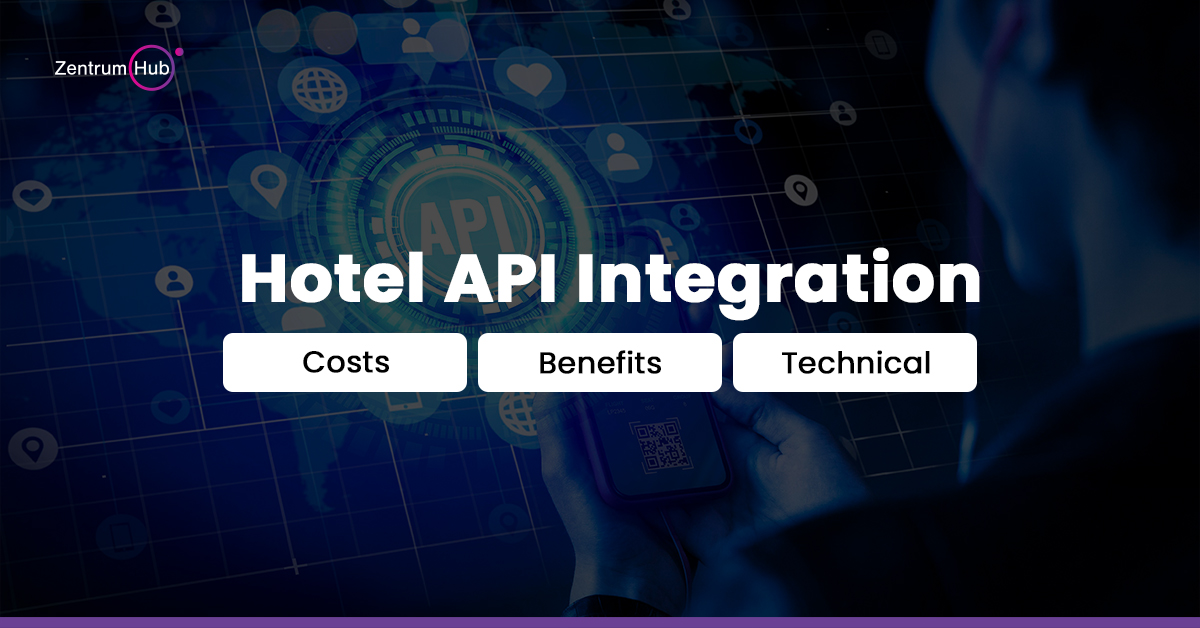
Online Travel Agencies (OTAs) face several challenges in a competitive market. Price competition pressures OTAs to offer low prices, reducing profit margins.
Managing real-time inventory, high customer acquisition costs, and ensuring secure payments add further complexity. Retaining customers is difficult due to low brand loyalty, while seamless integration with suppliers requires sophisticated technology.
Additionally, OTAs must handle frequent cancellations, keep pace with technological advancements, and navigate global expansion challenges like localization.
Finally, delivering personalized user experiences at a scale remains crucial but difficult. Overcoming these challenges requires innovative solutions, advanced technology, and strategic supplier partnerships to remain competitive and profitable.
Contents
With competition intensifying, OTAs must offer users a smooth experience. One crucial aspect of ensuring smooth operations and maximizing customer satisfaction is hotel API integration.
In this guide, we explore how hotel APIs work, their benefits, technical considerations, and the overall impact they can have on an OTA’s performance.
Hotel API integration is a technology that connects OTAs (Online Travel Agencies) with hotel databases, allowing real-time access to hotel inventory, pricing, and availability. Imagine you’re running an OTA like Booking.com or Expedia. When users search for hotels, they want real-time data on availability, pricing, and room types. Without API integration, it would be impossible to access this information from thousands of hotels around the globe.
Hotel APIs bridge this gap by allowing OTAs to interact directly with hotel management systems (PMS – Property Management Systems), central reservation systems (CRS), or global distribution systems (GDS). These systems provide live updates on room availability and pricing, enabling users to make bookings in real-time. This strong connection eliminates manual processes and the need to constantly update hotel data, thus streamlining the booking process.
How It Works:
Real-World Example:
Take Agoda, a popular OTA. When a traveler searches for a hotel in New York, Agoda uses hotel APIs to fetch real-time inventory from hotel databases, ensuring the traveler gets accurate prices and availability. The booking is completed without Agoda needing to manage the inventory directly, which simplifies the operational process.
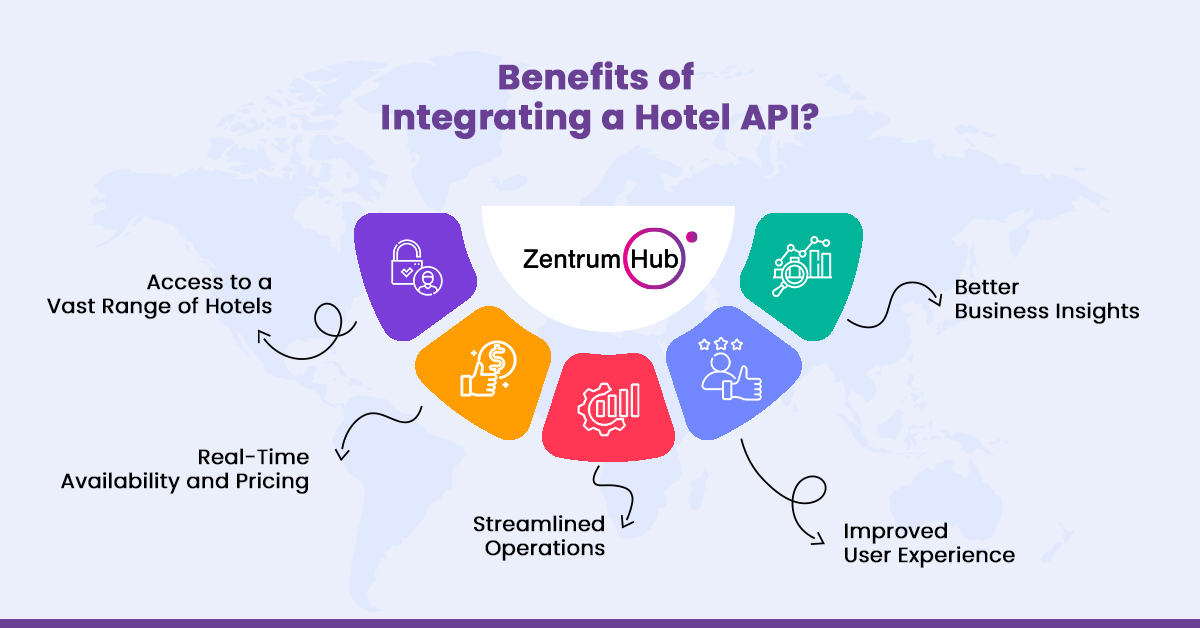
Hotel API integration offers OTAs a plethora of benefits that extend beyond simply accessing hotel data. Here are some key advantages:
APIs connect OTAs to multiple sources, including PMS, CRS, and GDS, which means you can offer your customers a wide variety of hotel options, from budget to luxury stays, in numerous locations worldwide.
By integrating with hotel APIs, your OTA can provide up-to-the-minute availability and pricing information. This ensures that users always see the most accurate data, reducing issues such as overbooking or pricing discrepancies.
API integration automates the process, which significantly reduces the need for human intervention and minimizes errors.
Real-time data, easybookings, and personalized options lead to a smoother user experience, helping to increase customer satisfaction and retention.
Integrating hotel APIs allows OTAs to analyze booking trends, availability patterns, and pricing strategies in real-time. These insights can help OTAs optimize their offerings and stay competitive.
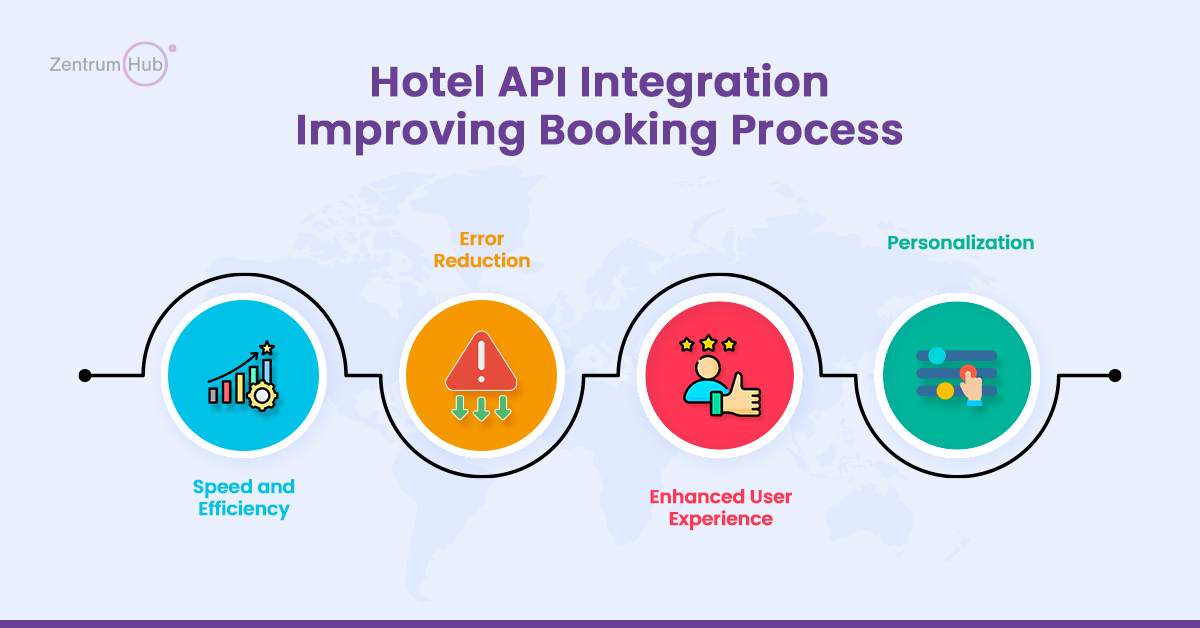
Hotel API integration directly enhances the booking process in several ways:
Hotel APIs facilitate instantaneous communication between the OTA and the hotel’s system, reducing the time it takes to search for hotels, check availability, and confirm bookings. This immediate feedback makes for a faster booking process, which is essential for today’s fast-paced consumers.
With automated data updates, manual errors such as overbooking or inaccurate pricing are drastically reduced. APIs ensure that the information presented to users is always up to date.
When users can access accurate, real-time data, they are more likely to have a positive experience on your OTA. This straightfoward experience—from search to booking—improves overall customer satisfaction.
APIs allow OTAs to offer personalized search results and recommendations, tailoring hotel options to individual users’ preferences. This personalization can lead to higher conversion rates and more satisfied customers.
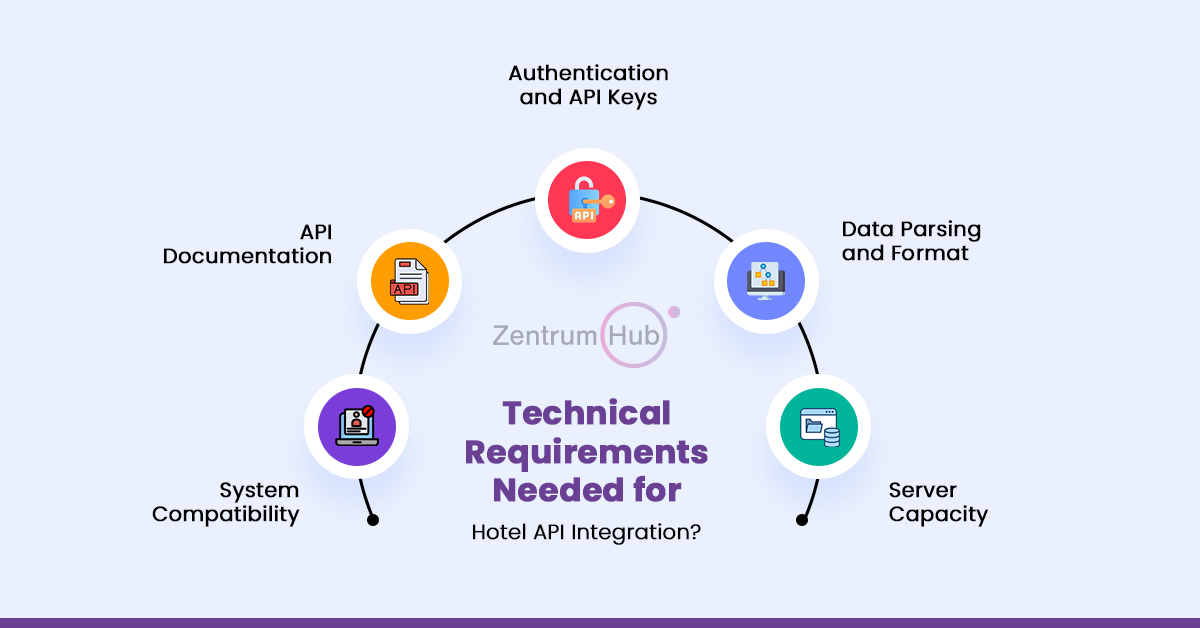
Before diving into hotel API integration, OTAs need to consider the technical requirements for a smooth implementation. Here’s a breakdown of what you’ll need:
Your OTA’s booking engine must be compatible with the API you plan to integrate. Most hotel APIs are designed to work with commonly used systems, but it’s essential to ensure compatibility with your existing software infrastructure, such as your content management system (CMS), payment gateway, and booking interface.
Every hotel API comes with comprehensive documentation that details how to make requests, handle responses, and manage errors. Thoroughly understanding this documentation is crucial for successful integration.
Most APIs use authentication mechanisms, such as API keys, OAuth tokens, or other security protocols. You’ll need to manage these keys carefully and ensure your system is secure.
Hotel APIs often use data formats such as JSON or XML. Ensure that your system can parse and interpret these formats correctly to display the data on your OTA.
Because hotel APIs often send large amounts of data in real-time, your server must be robust enough to handle the incoming and outgoing requests. Ensure that your server infrastructure is scalable and capable of supporting increased traffic.
Real-time data accuracy is one of the primary reasons for implementing hotel API integration. APIs ensure that room availability and pricing information is always current, but how does this work?
When a hotel makes changes to its inventory or rates (e.g., a room is booked or prices are adjusted), these updates are immediately reflected through the API. The OTA fetches this data in real-time, ensuring that users always see accurate information.
Hotel APIs establish two-way communication between the OTA and the hotel’s system. When a user makes a booking, the API instantly updates the hotel’s inventory to prevent overbooking.
Hotels often adjust their rates based on demand, seasonality, and availability. APIs ensure that these rate changes are updated instantly across all platforms, so there’s no risk of misquoted prices.
Advanced hotel APIs are optimized to minimize latency, ensuring that data flows quickly between the hotel and the OTA. This speed is critical for real-time bookings, where even a few seconds of delay can lead to missed opportunities or booking errors.
One of the key advantages of hotel API integration is its flexibility and customization options. While off-the-shelf APIs are designed to work for a wide range of OTAs, you can customize the API to meet your specific business needs.
Customization Options:
Case Study:
An OTA that focuses on luxury travelers may customize its API to only show 5-star hotels or properties with specific amenities, such as spas or gourmet restaurants. This tailored experience can increase user engagement and bookings.
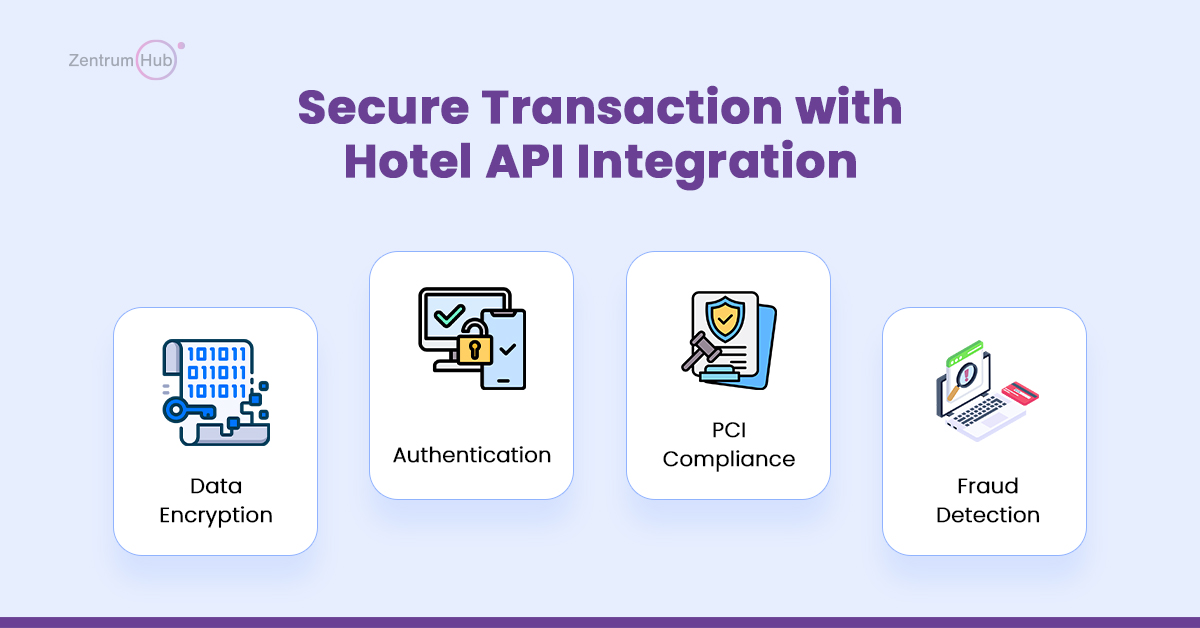
Security is a top priority for any OTA handling customer data and transactions. Hotel APIs are designed with robust security protocols to protect sensitive information, such as personal details and payment data. Here’s how they ensure security:
This ensures that sensitive information, such as customer names and credit card details, is encrypted during transmission.
APIs use authentication methods such as API keys, OAuth tokens, and IP whitelisting to ensure that only authorized users can access the system. This prevents unauthorized access to the booking system.
If your OTA handles payment data, it must comply with Payment Card Industry Data Security Standards (PCI DSS). Hotel APIs are often PCI-compliant, ensuring that payment data is processed securely.
Some hotel APIs offer built-in fraud detection tools that monitor suspicious booking behavior or flag potential fraud, adding an extra layer of security.
The timeline for hotel API integration depends on several factors, including the complexity of your system, the specific API being integrated, and the level of customization required. Here’s a general overview of the implementation process:
During this phase, your team will review the API documentation, assess your system’s compatibility, and outline the customization requirements. This is also the time to obtain any necessary API keys and plan the overall integration strategy.
In this phase, developers will write the code to integrate the API into your OTA’s system. They will also conduct extensive testing to ensure that the API functions as expected, handles requests efficiently, and displays accurate data.
Once development is complete, QA teams will test the API under different conditions, including heavy traffic, to identify and resolve any issues.
Once the integration is live, your team will monitor performance, address any post-launch issues, and make necessary adjustments.
Typical Timeline: 1-3 Months
For most OTAs, hotel API integration can take anywhere from one to three months, depending on complexity and resources.
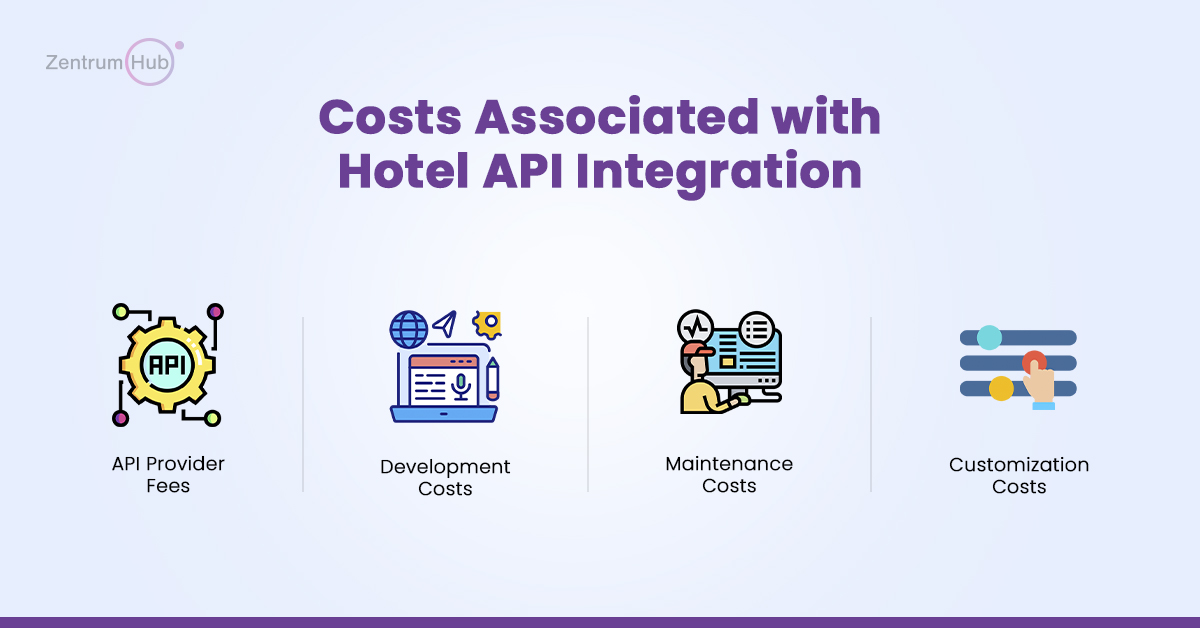
The cost of integrating a hotel API can vary widely based on factors such as the API provider, the complexity of your OTA’s system, and any customization you require. Here are the main cost components:
Hotel API providers typically charge for access to their services. These fees may be based on the number of API requests, bookings made, or a flat monthly rate. Some providers also offer tiered pricing models based on usage.
If you don’t have an in-house development team, you’ll need to hire developers to handle the integration. However, the development cost may vary depending on the complexity of the project.
APIs require ongoing maintenance to ensure compatibility with new features, bug fixes, and updates from the API provider. Budgeting for ongoing technical support is essential.
If you need significant customization, such as personalized search filters or dynamic pricing models, you’ll need to factor in additional development and testing costs.
Once your hotel API integration is complete, ongoing support and updates are critical for ensuring long-term success. Here’s what to expect:
Most API providers release regular updates to improve performance, fix bugs, and introduce new features. Your development team or API provider will need to implement these updates to keep the integration running smoothly.
API providers often offer customer support to assist with troubleshooting, error resolution, and performance optimization. Support may be offered via email, phone, or a ticketing system.
Many hotel APIs come with built-in monitoring tools that allow OTAs to track performance metrics such as response times, error rates, and booking success rates. This helps you identify issues before they affect users.
As your OTA grows, your API needs may change. You may need additional server capacity or new API features to handle increased traffic or bookings. Working with a flexible API provider that supports scalability is crucial for long-term growth.
Hotel API integration is a game-changer for OTAs, offering real-time access to hotel data, improved user experiences, and streamlined operations. By understanding the benefits, technical requirements, and costs associated with API integration, your OTA can stay competitive and deliver a hassle-free booking experience for customers.
Whether you’re a small OTA just starting out or a well-established player looking to optimize your operations, integrating a hotel API is a critical step toward success in the fast-paced travel industry.
